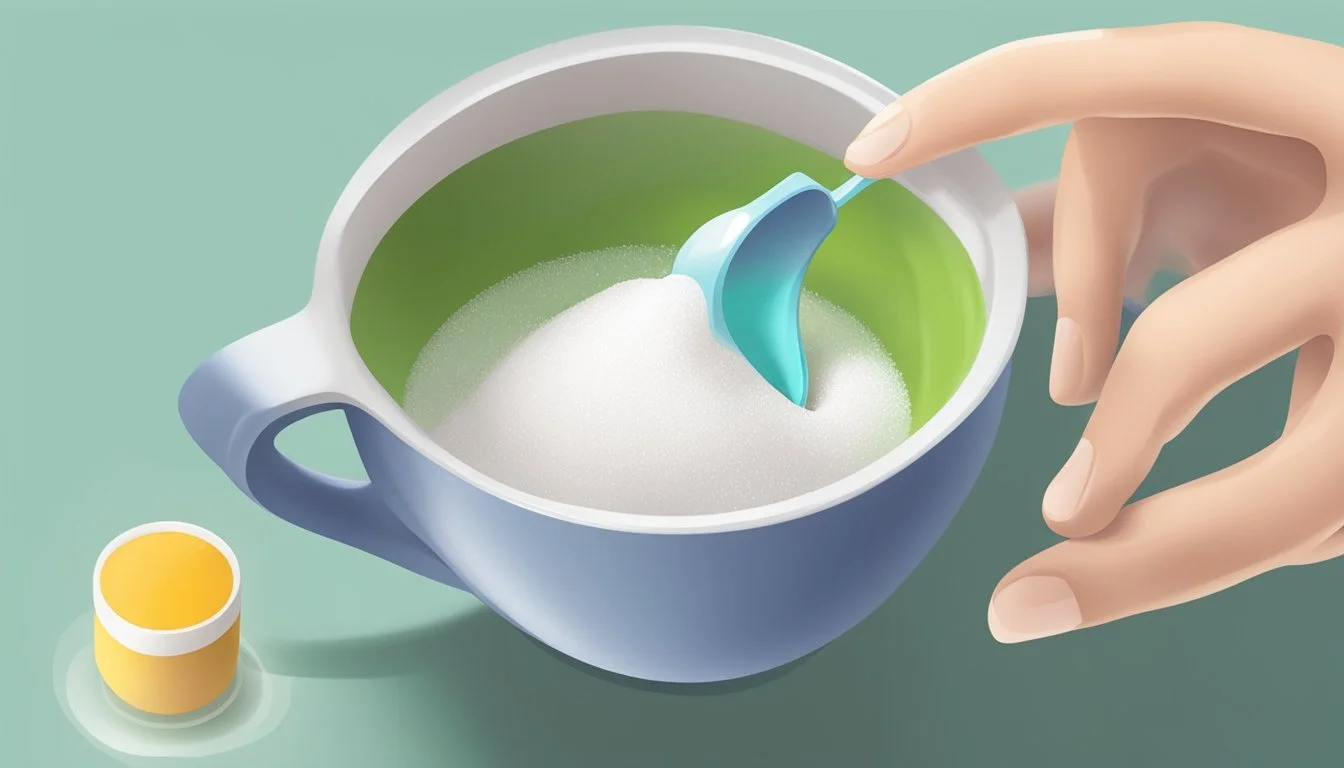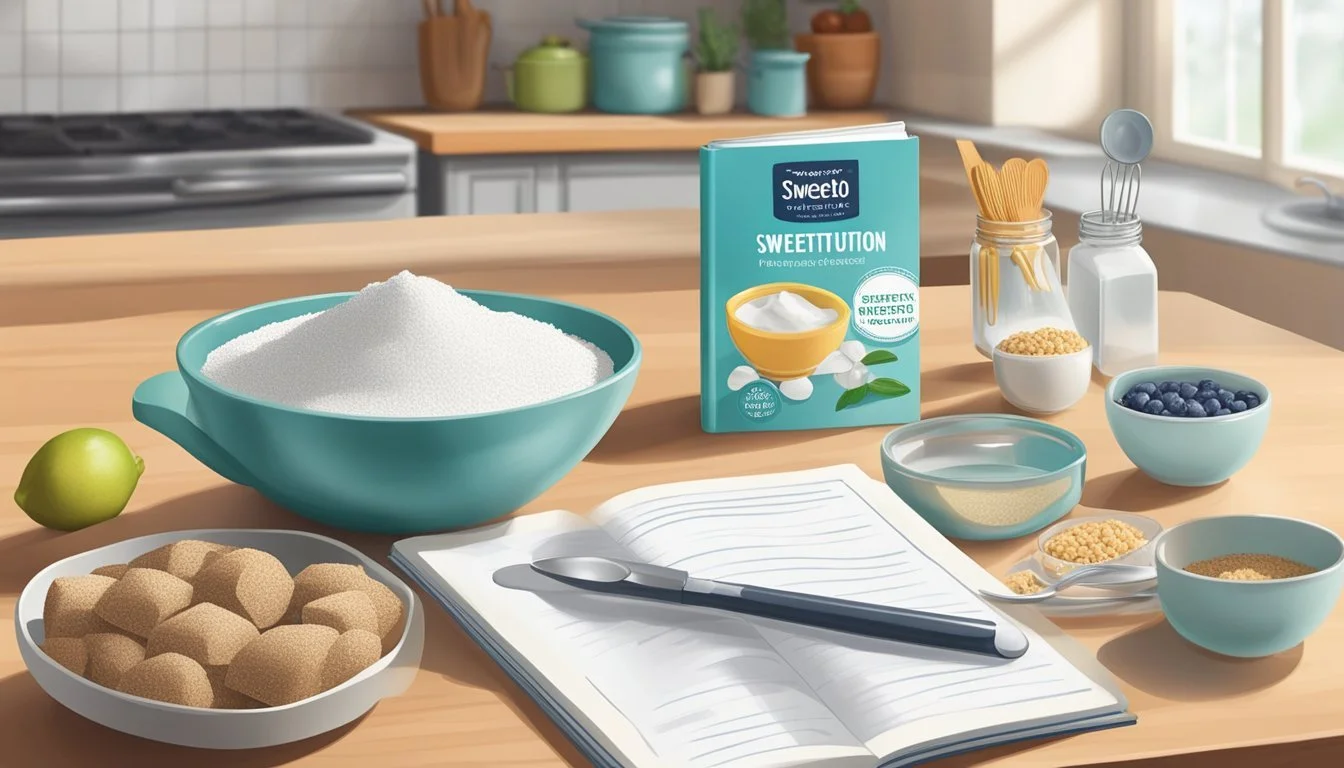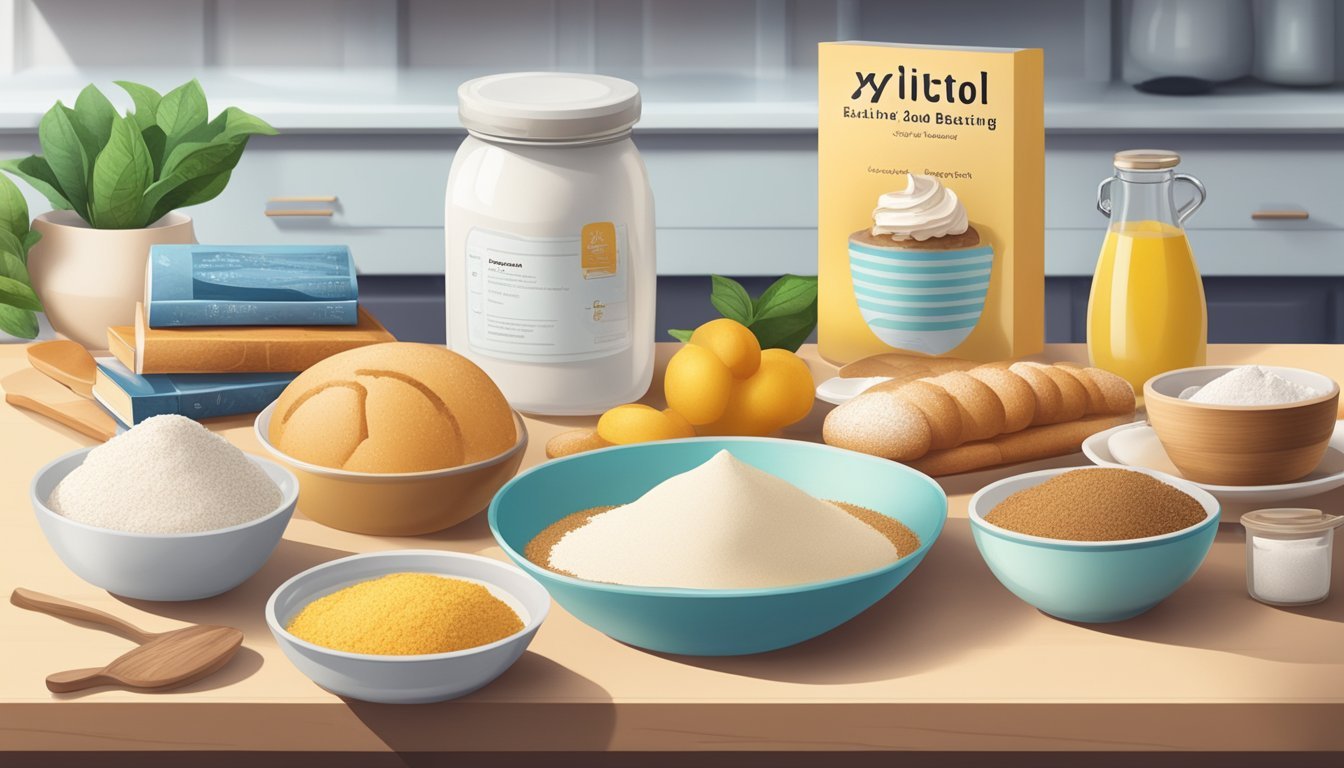How to Substitute Xylitol for Erythritol in Low-Carb Desserts
A Simple Guide
When creating low-carb desserts (What wine goes well with desserts?), sweeteners play a pivotal role in both the taste and the nutritional profile of the final product. Xylitol and erythritol are two common sugar alcohols used by those following a low-carb or ketogenic diet. Understanding how to substitute xylitol for erythritol in dessert recipes is crucial for those who prefer xylitol's flavor profile or have erythritol on hand. They are similar in their sugar-free status and can be used to sweeten a variety of desserts without spiking blood sugar levels.
Xylitol has the same sweetness level as sugar, making it a straightforward substitute in terms of flavor. When substituting xylitol for erythritol in recipes, it's important to consider that erythritol is about 70% as sweet as sugar. Consequently, to achieve the same level of sweetness when using xylitol in place of erythritol, less xylitol should be used. Chefs need to adjust the amount used to ensure the dessert does not become overly sweet.
Moreover, while substituting these sweeteners, chefs ought to be mindful of other attributes beyond sweetness. Xylitol behaves similarly to sugar in recipes, providing a comparable texture and moisture balance. It's also beneficial to note that xylitol carries about 40% fewer calories than sugar, which can be a helpful consideration for those tracking their caloric intake. With these points in mind, one can achieve the desired sweetness and texture in their low-carb desserts without compromising on taste or nutritional goals.
Understanding Sweeteners
When considering sugar substitutes in low-carb desserts, one should be aware of the different types of sweeteners and their properties. This section elaborates on the various options available and the basics of sugar alcohols, which both erythritol and xylitol belong to.
Different Types of Sweeteners
Sweeteners can broadly be categorized into natural sweeteners, sugar alcohols, and artificial sweeteners. Natural sweeteners, like stevia, are extracted from plants and often have a negligible effect on blood glucose levels, making them popular for low-carb diets. Artificial sweeteners encompass a range of synthetic sugar substitutes and are often calorie-free. Sugar-free sweeteners refer to any sweetener that does not contribute to sugar intake, which can include both natural and artificial options.
Natural Sweeteners:
Stevia: 300 times sweeter than sugar, no calories
Others include monk fruit and allulose
Artificial Sweeteners:
Examples include aspartame, sucralose, and saccharin
Sugar Alcohols Basics
Sugar alcohols are a type of reduced-calorie sweetener often used in place of sugar due to their lower effect on blood glucose. They are not completely calorie-free but provide fewer calories than standard sugar. Erythritol and xylitol are popular sugar alcohols in low-carb baking.
Erythritol: Roughly 70% as sweet as sugar; commonly used because it has a negligible impact on blood sugar and almost zero calories
Xylitol: As sweet as sugar but contains about 2.4 calories per gram (sugar has 4 calories per gram)
When substituting xylitol for erythritol in recipes, one needs to consider the sweetness level and caloric content as they differ slightly. This can affect not only the taste but also the nutritional value of the dessert.
Benefits of Low-Carb Desserts
Low-carb desserts offer significant advantages particularly for individuals monitoring their blood sugar or caloric intake. Adapting traditional sweet recipes to fit a low-carb or keto lifestyle can have noticeable health benefits.
Impact on Blood Glucose
Low-carb desserts typically have a lower glycemic index which means they are less likely to cause rapid spikes in blood glucose levels. Substituting high-glycemic ingredients with low-carb alternatives such as xylitol helps individuals with diabetes manage their blood sugar more effectively. This is because xylitol has a negligible effect on blood glucose compared to erythritol or other traditional sweeteners.
Erythritol: 0 glycemic index
Xylitol: 7-13 glycemic index (still lower than sugar)
These options are particularly beneficial on a ketogenic diet which aims to minimize sugar intake to maintain a state of ketosis, known to help in managing diabetes and reducing fluctuations in the body's blood glucose levels.
Caloric Differences
Low-carb sweeteners typically provide fewer calories than sugar, aiding in weight management — an important aspect of maintaining overall health, particularly for those with diabetes. For instance, xylitol has approximately 40% fewer calories than sugar which makes it an attractive substitute for erythritol in low-carb desserts.
Sugar: 4 calories per gram
Xylitol: 2.4 calories per gram (approximately)
Erythritol: 0.24 calories per gram
This significant difference in calories contributes to the popularity of xylitol and erythritol among those following a keto or low-carb diet, as it allows them to enjoy sweet treats without consuming a high number of calories.
Substituting Xylitol for Erythritol
When making low-carb desserts, it's important to understand how xylitol compares to erythritol in terms of conversion ratios, texture, and taste. This knowledge ensures a successful substitution.
Conversion Ratios
The conversion ratio between xylitol and erythritol is typically 1:1, meaning that one can replace erythritol with xylitol in equal amounts. Both are sugar alcohols and share a similar level of sweetness, which makes direct substitution possible. When replacing:
1 cup erythritol = 1 cup xylitol
Be aware though, that some slight variations might be necessary depending on the brand.
Texture and Taste Adjustments
Texture can be affected when substituting xylitol for erythritol. Erythritol tends to have a cooling sensation and can sometimes create a grainy texture in desserts, whereas xylitol has a texture closer to that of sugar and does not typically produce this cooling effect.
For taste, xylitol is often described as being very similar to sugar, without any aftertaste, while erythritol might carry a mild aftertaste and is less sweet. Cooks should taste their dessert and adjust as needed when using xylitol to ensure the desired outcome is achieved.
Sweetness Levels
The sweetness level of xylitol is closer to that of sugar, which makes it an easier substitute in recipes originally designed with sugar in mind. In contrast, erythritol has about 70% of the sweetness of sugar, so when substituting xylitol for erythritol, one might find that the dessert is slightly sweeter. This potential increase in sweetness can be an advantage or require adjusting the amount of xylitol downwards to match the desired level of sweetness.
For reference, when dealing with sweetness substitutions:
Erythritol: 70% as sweet as sugar
Xylitol: Equal sweetness to sugar
One should always refer to a current sweetener conversion chart as a guide for precise measurements.
Considering Health Aspects
When substituting xylitol for erythritol in low-carb desserts, it's important to understand the health implications, particularly concerning their glycemic impact and digestive tolerance.
Glycemic Index Information
Erythritol has a glycemic index (GI) of 0, making it an excellent choice for those monitoring their blood sugar levels. In contrast, xylitol maintains a low but notable glycemic index of about 7 to 13, which is still much lower than regular sugar but may have minimal effects on blood sugar levels.
Digestive Tolerance
Both erythritol and xylitol can cause digestive side effects, although erythritol is typically better tolerated. Xylitol, when consumed in large amounts, can lead to gas or bloating as it is not fully absorbed by the body and ferments in the large intestine. To minimize these effects, individuals should consider gradually introducing xylitol into their diet to assess their personal tolerance.
Baking with Sugar Alcohols
In low-carb baking, sugar alcohols like xylitol and erythritol are popular replacements for sugar due to their reduced calorie content. Understanding their chemical properties and how they respond to heat is essential for successful substitution.
Chemical Properties
Sugar alcohols, such as erythritol and xylitol, are carbohydrates that chemically resemble both sugar and alcohol, though they contain neither ethanol nor sugar. They are derived from natural sources; for instance, erythritol is processed from corn, while xylitol is most commonly extracted from birch wood or corncobs. Here are some key points:
Caloric Content: Erythritol has about 0.24 calories per gram, significantly less than xylitol's 2.4 calories per gram.
Sweetness: Erythritol is approximately 70% as sweet as sugar, while xylitol is as sweet as sugar, assisting in more precise replacements.
Heat Response
The response of sugar alcohols to heat is central to baking applications:
Stability: Both erythritol and xylitol are heat stable, meaning they can retain sweetness at high temperatures common in baking.
Melting Point: Xylitol has a lower melting point than sugar, which can impact texture; erythritol has a higher melting point, often resulting in a cooling sensation when dissolved.
Bakers must note that neither erythritol nor xylitol caramelize like sugar, which can affect the color and flavor of desserts. It is important to adjust recipes for moisture balance as these sugar alcohols can influence the dryness or wetness of the final product.
Practical Tips and Tricks
When substituting xylitol for erythritol in low-carb desserts, it's crucial to understand the sweetness level and texture implications. Accurate measurement and careful handling can ensure successful modification of your favorite recipes.
Recipe Modifications
One must account for the slight difference in sweetness when replacing erythritol with xylitol. Erythritol is about 70% as sweet as xylitol, which is comparable in sweetness to sugar. A common guideline for substitution is to use a straight 1:1 ratio by volume, simplifying the process for home bakers. However, due to slight variances in taste perception, it’s advisable to start with a slightly smaller amount of xylitol and adjust according to taste preference.
For baking recipes:
1 cup erythritol = 1 cup xylitol (start with ¾ to ⅞ cup and adjust)
Non-baking recipes might require more fine-tuning:
Dissolve xylitol in a liquid component for a smoother texture in cold applications such as ice creams.
Cooking:
Beware of the different melting points: xylitol melts at a lower temperature than erythritol, which may affect the outcome of recipes like caramel.
Avoiding Common Pitfalls
The replacement of erythritol with xylitol doesn't come without challenges. Xylitol absorbs moisture more than erythritol, which can impact the dryness of a dessert. Here's how to avoid common pitfalls:
Texture:
Cakes and cookies: monitor closely as xylitol may produce a moister batter or dough. Adjust baking times as needed.
Crispy desserts: reducing liquid by a small amount might help retain crispness.
Cooling Sensation:
Erythritol often imparts a cooling mouthfeel, which xylitol does not. This lack of a cooling effect can be a benefit in recipes where the cooling sensation of erythritol is undesirable.
Digestive Sensitivity:
Introduce xylitol gradually to assess tolerance, as it can cause digestive discomfort in a subset of individuals if not accustomed to its consumption.
By understanding these nuances and starting with these tips and tricks, one can confidently substitute xylitol for erythritol, resulting in delightful, low-carb desserts that maintain their intended taste and texture.
Comparing Sweetener Options
When substituting sweeteners in low-carb desserts, it's essential to understand the properties and sweetness ratios of each option. This section provides a focused comparison between erythritol and xylitol in relation to other common sweeteners.
Erythritol vs. Other Sweeteners
Erythritol
Erythritol is a sugar alcohol that is 70% as sweet as sugar. It has a glycemic index of 0, meaning it does not spike blood sugar levels. Erythritol has almost no calories and is excreted from the body without being metabolized, thus it is a popular choice for keto and low-carb baking. When comparing to other sweeteners:
Stevia: This natural sweetener is derived from the leaves of the Stevia plant and is about 300 times sweeter than sugar. Thus, you would use far less stevia to achieve the same level of sweetness.
Monk Fruit: Similarly to stevia, monk fruit extract is around 300 times the sweetness of sugar. It can also be used in very small quantities.
Sucralose: A zero-calorie artificial sweetener that is approximately 600 times as sweet as sugar. It is not a 1:1 substitute and may require a bulking agent when used in baking.
Sweetener Relative Sweetness to Sugar Calories Glycemic Index Erythritol 70% Almost 0 0 Stevia 30,000% 0 0 Monk Fruit 30,000% 0 0 Sucralose 60,000% 0 0
Xylitol vs. Other Sweeteners
Xylitol
Xylitol is another sugar alcohol with a sweetness identical to sugar. It contains 2.4 calories per gram, which is lower than sugar's 4 calories per gram. It’s often used as a direct replacement in recipes due to its similar bulk and sweetness level. It does have a lower digestive tolerance and can raise blood sugar slightly, with a glycemic index of 7. Compared to erythritol and other sweeteners:
Erythritol: Has a lower sweetness level, almost zero calories, and no impact on blood sugar.
Stevia and Monk Fruit: These are much sweeter than xylitol, thus you would need smaller quantities.
Sugar: Xylitol matches the sweetness of sugar but offers fewer calories and a minimal effect on blood sugar.
Sweetener Relative Sweetness to Sugar Calories Per Gram Glycemic Index Xylitol 100% 2.4 7 Sugar 100% 4.0 65 Erythritol 70% Almost 0 0
When using xylitol in place of erythritol, one should take into account the slight difference in sweetness, caloric content, and glycemic index to achieve the desired outcome in low-carb desserts.
Safety and Side Effects
When substituting xylitol for erythritol in low-carb desserts, it is important to consider the safety and potential side effects of these sugar substitutes. Xylitol and erythritol are generally safe for human consumption, but there are specific concerns to be aware of, including toxicity to certain animals and intolerance in some individuals.
Toxicity to Animals
Dogs are particularly susceptible to xylitol toxicity. Xylitol can cause a rapid release of insulin in dogs, leading to hypoglycemia, which can be life-threatening. Symptoms of xylitol poisoning in dogs include vomiting, weakness, and coordination problems. Pet owners need to be vigilant and ensure that any xylitol-containing desserts are kept out of reach of their dogs.
Symptoms of Xylitol Poisoning in Dogs:
Vomiting
Weakness
Coordination problems
Potential seizures
Potential for Allergies or Intolerance
While xylitol is generally well-tolerated, some individuals may experience allergies or intolerance to sugar alcohols. Intolerance can manifest as digestive distress, including symptoms like gas, bloating, and diarrhea. These side effects typically occur when sugar alcohols are consumed in large quantities, as they are not completely absorbed by the body and can ferment in the intestines.
Symptoms of Intolerance to Sugar Alcohols:
Gas
Bloating
Diarrhea
Individuals with known sensitivities should proceed with caution when consuming desserts containing xylitol and consider limiting their intake to avoid any uncomfortable side effects.
Alternative Sweetener Suggestions
When substituting xylitol for erythritol in low-carb desserts, one must consider the sweetness level and how it affects the final product. This section explores using Stevia and Monk Fruit as alternatives and discovering new sweeteners that suit low-carb and ketogenic diets.
Using Stevia and Monk Fruit
Stevia is a non-nutritive sweetener, which means it has zero calories and carbs. Extracted from the leaves of the Stevia rebaudiana plant, it is approximately 300 times sweeter than sugar. To substitute erythritol with Stevia in recipes, use the following ratio:
1 teaspoon of erythritol = 1/4 teaspoon of Stevia powder or 6-9 drops of Stevia liquid.
Monk fruit, also known as Luo Han Guo, is a natural sweetener that contains no calories and does not affect blood sugar levels. It is comparable to Stevia in its sweetness level, being about 300 times sweeter than sugar. Here’s a conversion tip:
1 teaspoon of erythritol = 1/4 teaspoon of monk fruit sweetener.
Exploring New Sweeteners
In addition to Stevia and Monk Fruit, those on a ketogenic diet may wish to explore other sugar alternatives, such as Allulose. Allulose is a rare sugar naturally occurring in small quantities in wheat, figs, and raisins. It has about 70% of the sweetness of sugar but only 10% of the calories, making it an excellent choice for low-carb desserts. For those switching from erythritol to Allulose, use this guide:
1 cup of erythritol = approximately 1 and 1/3 cups of Allulose.
The range of sugar-free sweeteners on the market allows for flexibility when making low-carb or keto-friendly desserts. A keen understanding of sweetness levels and conversion ratios is essential for successful recipe alteration.






